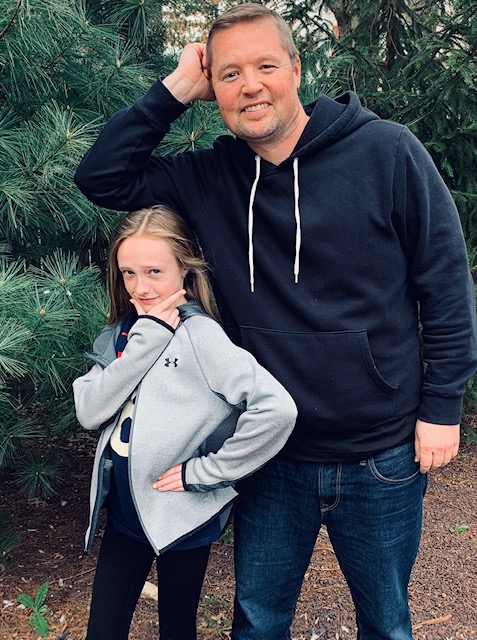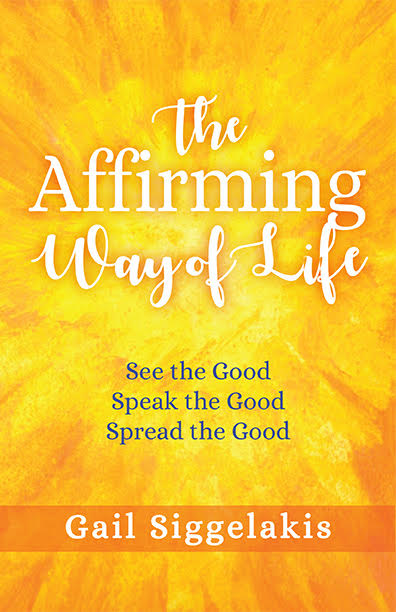Guest Post: Talking Badly to Yourself? Try Self-Forgiveness
by Gail Siggelakis
~~
This month I’m honored to present a guest post written by author, presenter, and award-winning teacher Gail Siggelakis. Gail’s book, The Affirming Way of Life, presents simple, engaging, and effective ways to build stronger relationships, discover greater happiness, and live the life you were meant to live. If you’re looking for a good book this summer, I encourage you to check it out. You can read more about Gail on her website theaffirmingway.com.

Fun fact: Gail is the mother of a student I taught 10 years ago. The student liked to eat apples in class. Not apple slices. But big, crunchy fresh-plucked red apples. When he finished, he would move the gnarled core to the edge of his desk, cross his legs, and ask me a question about a question I already answered when he was busy chewing.
He turned out to be one of my favorite students ever.
So without further adieu…
Talking Badly to Yourself? Try Self-Forgiveness
Jay is my son’s most life-changing high school teacher, so I’m honored to be invited to do a guest blog for him.
“Congrats on the book and blog and everything you’ve accomplished!” He emailed. “I see an intersection between your work and mine—you might want to contribute a post to my monthly self-forgiveness challenge. Forgiveness is the key to living a better life…”
“I’d love that, Jay.”
I feel an affinity to write about self-forgiveness. I am so guilty of beating myself up needlessly with negative self-talk. In my book, The Affirming Way of Life: See the Good, Speak the Good, Spread the Good, I wrote about my negative self-talk habit in the past tense. But, the slow-down of forward movement in my life, thanks to Covid-19, has brought my old, familiar, undermining voice back.
I first became aware of her (my negative voice) again, during a conversation with a friend who’s a life coach.
She was telling me a story about coaching someone with a self-defeatist attitude and I said, “Gee, that sounds like me. Gus (my husband) and I have been doing puzzles. When I’m working on a section that’s hard, I say things like, ‘the piece must be missing, or I’ll never be able to do this.”
Whoa! By expressing what had been playing out in my head, I could see I was having negative expectations of my puzzling ability. And I was repeating that same message over and over!
Now I was on the lookout to catch my self-defeatist voice in action because it was definitely making me feel weakened and bad about myself. A few days later, I was researching bloggers who wrote about similar subjects to me. My hope was to find someone with a larger following than me who might invite me to be a guest blogger (thank you, Jay, for assisting me to work on my goal). The ones that appealed to me had from 80,000-100,000 followers.
To have so many followers they must have something I just don’t have. I’m not in their league. I will never get a following like that. I don’t have what it takes, I said to myself.
Double Whoa! There was my old comparing-self-to-others voice, giving me the same defeatist message as when I was working on puzzles. I was intimidated by the disparity between their number of followers and mine, and went right to putting myself down. I felt like a dark cloud took residence in my heart and mind.
It has always made me sad, when I finally find my confidence that I spoke so hurtfully and mean to myself. I’d never do that to someone else. This is where self-forgiveness works her magic.
In a kind, compassionate voice that I would offer anyone else, I said to myself, “I am so sorry, Gailie, for speaking to you that way. You are hard-working and capable, you’ve accomplished many other goals, and you can do this!”
After apologizing to myself I create or reframe a new message with perspective and hope. My first step was to shift my perspective. I journaled about my successes as a blogger, writer, and speaker to focus on what I could do, not what I couldn’t. I also turned to my inner circle of people who I could rely on to remind me of my strengths and broaden my view of the situation.
With the puzzles I now say: “Hang in there. In time, you always connect the pieces.”
With the blogging I now say: “Be patient. Developing a following takes time. The people you’re comparing yourself to have been at it more than 10 years. Give yourself a break!”
Getting from put-downs to build-ups doesn’t usually happen as seamlessly as it sounds hear. I may live with the put-down for days (even weeks), but once I identify it, it’s become my habit to forgive myself for literally turning against myself. Speaking with self-compassion and positively reframing what I say to myself are two of the best tools I possess. Try them. I wish for you the empowerment, joy, and ease they can bring!
~~
If you liked this post, check out:
Choosing Forgiveness
~
You can’t do this life alone
~~
Need some encouragement? Some perspective? This hardworking, almost-handsome, suburban soccer dad can help. Subscribe and, like a pizza, get my posts delivered to your door (your email inbox). No spam. Just posts.

1. Reading
2. Writing
3. Exercising
4. Hearing his children laugh
5. Hugging his wife
(Bonus points for a dinner with his parents and a beer with his friends)






